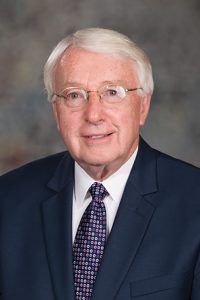Child care safety bill becomes omnibus public health measure, advances
A bill intended to standardize child care and protection rules at Nebraska schools was amended to become an omnibus public health measure and advanced from general file April 3.

Ralston Sen. Merv Riepe, sponsor of LB1034, said that currently both the state Department of Health and Human Services and the state Department of Education have jurisdiction over elementary schools for the safety of children. DHHS has oversight during programs before and after school that are located within a school, he said, and the Department of Education has oversight during the school day.
“The safety requirements are vastly different depending on the time of day,” Riepe said. “There is no additional risk for these children before or after school, there are just different departments providing oversight.”
The bill would require the standards of care and protection for school-age child care programs located within an accredited or approved school to meet the same standards of an accredited or approved school under state Department of Education regulations.
Riepe offered an amendment, adopted 38-0, which would specify that if a school-age child care program accepts reimbursement from a state or federal program, DHHS would determine whether the program complies with the requirements for reimbursement.
A Health and Human Services Committee amendment, adopted 38-0, added provisions of five additional bills:
• LB344, sponsored by Thurston Sen. Joni Albrecht, which would change credentials and regulations for substance abuse centers;
• LB686, sponsored by Bellevue Sen. Carol Blood, which would adopt the Psychology Interjurisdictional Compact;
• LB894, sponsored by Bellevue Sen. Sue Crawford, which would adopt the EMS Personnel Licensure Interstate Compact, known as REPLICA;
• LB924, sponsored by Riepe, which would change provisions within the Emergency Medical Services Practice Act, Occupational Therapy Practice Act and Uniform Credentialing Act; and
• LB1057, sponsored by Heartwell John Kuehn, which would change provisions relating to the prescription drug monitoring program.
Albrecht said LB344 was introduced as part of the governor’s occupational licensure reform legislative package. The bill provides an alternative method to obtain an alcohol and drug counseling license or mental health practice license in Nebraska through reciprocity with other states, she said.
“[It] reduces regulatory burdens by streamlining the separate licensing processes for mental health centers and substance abuse treatment centers,” she said.
Riepe said LB686 was introduced in an attempt to remove as many hurdles to employment as possible for veterans and military spouses by facilitating the practice of telepsychology. The bill would authorize telepsychology across state lines in member states when the compact becomes operational.
LB894 would enter Nebraska into another compact, REPLICA, which would allow the state’s EMS personnel to provide care across state lines under authorized circumstances and to provide standardized practices and accountability for licensed EMS personnel from other REPLICA states to provide intermittent care in Nebraska.
“Like other compacts, LB894 eliminates red tape and allows licensed and qualified EMS personnel to provide care in another state under certain circumstances without having to obtain additional licenses,” Riepe said.
Riepe said many elements were stricken from his LB924 to eliminate opposition to the bill as introduced. The remaining provisions would allow for criminal background checks to be performed for initial licensure or reinstatement if required by an interstate licensure compact and would provide a number of new definitions.
Kuehn said LB1057 would make three basic changes to the state’s prescription drug monitoring program by eliminating an inconsistent deadline for veterinary reporting, distinguishing between different types of pharmacies and redefining dispenser to ensure that those dispensing in an in-patient facility have access to the PDMP.
Seward Sen. Mark Kolterman offered an amendment to the committee amendment to add provisions of his LB703 and LB704.
LB703 would provide an exemption from Nebraska’s unlawful practice of medicine statutes for physicians from another state who accompany an athletic team or organization into the state for an event. The exemption would be limited to treatment provided to a team or organization while present in Nebraska.
LB704 would reduce the requirement for licensure of physician graduates of foreign medical schools from three to two years. Other licensure requirements would not change.
“This legislation will make Nebraska a more attractive place for foreign medical graduates to serve their residencies, which will in turn help our hospitals and our physician clinics recruit more physicians to our state,” Kolterman said.
The amendment also included provisions of Riepe’s LB1035, which would make a technical change to the state’s Stroke System of Care Act.
Following adoption of the Kolterman amendment 37-0, lawmakers advanced LB1034 to general file on a 39-0 vote.

